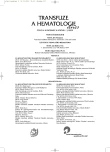-
Medical journals
- Career
ProC®global in patients with antiphospolipid antibodies
Authors: A. Buliková 1; D. Néméthová 2; M. Penka 1; J. Zavřelová 1; L. Dušek 2
Authors‘ workplace: Oddělení klinické hematologie, Fakultní nemocnice Brno 1; Centrum biostatistiky a analýz, Masarykova Univerzita Brno 2
Published in: Transfuze Hematol. dnes,11, 2005, No. 4, p. 154-161.
Category: Comprehensive Reports, Original Papers, Case Reports
Overview
Antiphospholipid antibodies (APA) are known to be associated with thrombembolic events and/or recurrent foetal loss. Their possible action to the blood coagulation system seems to be various and could lead to prothrombotic tendency. An important mechanism involved in this process has been referred – the influence on the protein C inhibiting pathway. The aim of our study was to determine abnormalities in protein C pathway by the test ProC®global in patients with antiphospholipid antibodies. 126 patients and 64 controls were evaluated. ProC®global values were significantly lower (p < 0.001) in patients than in healthy persons and in patients who undervent venous thromebolism (p < 0.001) when comparing them with persons without this complication. Using ROC analysis we could determine cut off patients with higer risk of the thrombosis. In women ProC®global value < 0.8 were asociated with the 1.8-fold thrombotic risk increasing, in men ProC®global value < 0.71 with 1.7-fold.
Key words:
antiphospholipid antibodies, ProC®global, thrombosis, risk prediction
Labels
Haematology Internal medicine Clinical oncology
Article was published inTransfusion and Haematology Today

2005 Issue 4-
All articles in this issue
- A combined antigen-antibody HCV detection assay
- Could lupus anticoagulants presence influence anticoagulant treatment in patients with antiphospholipid syndrome?
- ProC®global in patients with antiphospolipid antibodies
- Impairment of fertility and its preservation in patients undergoing systemic chemotherapy for Hodgkin lymphoma, summary and authors experiences
- History and present of the treatment of lymphoblastic leukemia in children
- Transfusion and Haematology Today
- Journal archive
- Current issue
- Online only
- About the journal
Most read in this issue- Could lupus anticoagulants presence influence anticoagulant treatment in patients with antiphospholipid syndrome?
- A combined antigen-antibody HCV detection assay
- History and present of the treatment of lymphoblastic leukemia in children
- ProC®global in patients with antiphospolipid antibodies
Login#ADS_BOTTOM_SCRIPTS#Forgotten passwordEnter the email address that you registered with. We will send you instructions on how to set a new password.
- Career

